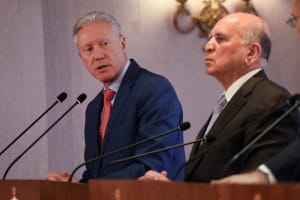Israeli settlements 101: Everything you need to know
ALL ISRAEL NEWS tries to answer all of your most pressing questions about the West Bank.
What are the Israeli settlements? What is the West Bank? How is it different from Judea and Samaria, if at all?
These are the kinds of questions that people who read news about Israel want to understand. ALL ISRAEL NEWS asked Jeremy Sharon, a veteran Israeli reporter, to explain.
Answers have been edited for brevity and clarity.
What is a settlement versus an outpost?
A settlement is a town or city in the West Bank that has been authorized by the Israeli government. It is considered a legal place to live for Israelis and is connected to every aspect of Israeli infrastructure, including electricity and water.
An outpost is considered an unauthorized dwelling. It's where settlement activists have established a town or small residence without government authorization.
In 1996, the government passed a decision that in order to establish any kind of settlement in the West Bank, you need the approval of the cabinet and the authorization of the defense minister. So, an outpost is lacking those permits and authorizations, which often means that those towns won't have immediate access to electricity or water and will have to find ways of hooking their residences up to those networks in a kind of informal manner.
How many settlements are there?
There are about 135 settlements and 140 outposts.
The outposts are often very small. Sometimes they can be a built-up neighborhood of an existing settlement.
How fast is the Jewish settlement community growing?
It depends exactly who you ask. According to the Settlement Council of Judea and Samaria, it is [growing] by about 7,000 people a year. And most of that is natural growth. Peace Now says the numbers are more like 10,000 people a year.
Does growth go up more or less depending on who has political power?
For most of the last 20 years there has been a right-wing government and the truth is that the settlement population has grown at a pretty stable rate.
What is the distinction between eastern Jerusalem and the West Bank?
There are 450,000 residents in the West Bank and that number jumps to around 700,000 when you add in East Jerusalem.
In 1980, the Knesset passed a law called the Jerusalem Law, which annexed Jerusalem. East Jerusalem was the area of Jerusalem that was captured by Jordan in 1949 and that Israel took control of during the Six-Day War in 1967.
Israel began creating neighborhoods in that area and now there are around 200,000 to 250,000 Jews living in those neighborhoods in eastern Jerusalem.
Israel does not consider the neighborhoods in eastern Jerusalem to be settlements. It considers them to be part of Israel, although the international community does not recognize Israel’s annexation and considers all those residents of east Jerusalem neighborhoods to be settlers.
The U.S. “legalized” settlements under former U.S. President Donald Trump. How does that impact Jerusalem and what does that really mean for the settlement community?
Under Trump, the State Department, led by then Secretary of State Mike Pompeo, issued the legality of the settlements and came to a new determination saying that settlements were not per se illegal, differing from a lot of other opinions in the international arena.
Are the settlements more of a legal and political issue?
The issue of the settlements is more of a political concern, with Israel asserting its right to parts of the West Bank, which is also known as Judea and Samaria and considered the biblical heartland. This is land mentioned in the Bible and many Israelis see their right to live in the West Bank as derived from there.
The Palestinians obviously would like large parts of the West Bank to be part of their state and see the settlements as making it more difficult to create a two-state solution because it's harder to separate the two entities of Israel and a future state.
Has Israel ever dismantled settlements?
Israel created some settlements in the Sinai Peninsula, which Israel took control of after the Six-Day War. There were 18 settlements in the Sinai Peninsula and when Israel made peace with Egypt in 1979, part of the deal was that Israel had to evacuate the settlements and remove all of its troops from Sinai. So, Israel removed all 18 settlements from the Sinai Peninsula in 1982.
In 2005, Israel carried out the disengagement from Gaza. There were several Israeli settlements in Gaza at the time numbering about 1,500 people. Israel unilaterally agreed to remove those settlers from the territory. At the same time, as part of efforts to advance a peace process with the Palestinians, Israel also evacuated some settlements in the northern West Bank.
You mentioned that the settlements are part of the biblical map. Can you elaborate?
Judea and Samaria are certainly connected to Jewish history and our part of the landscape where the forefathers and the Jewish people were present in ancient times. You have the city of Hebron where you go to the Tomb of the Patriarchs. There’s a biblical account that is very famous of Abraham buying a plot of land in Hebron in order to bury his wife, and subsequently he was buried there and along with the other forefathers and matriarchs, so you've got that aspect.
You have lots of other biblical sites, like the tomb of Joseph. You have altar sites from the time of Joshua. Despite any political borders or political demarcations, the entire land of Israel is associated with the Jewish people going back almost 4,000 years. Israel has a very good historical claim to be present in the region.
Are the settlements really an obstacle to peace?
Many of the 450,000 to 500,000 Jewish settlers in the West Bank live close to what is called the Green Line. In the future, if there were to be a peace agreement with the Palestinians, it would be possible to include those large settlements – where the majority of settlers live – back into the border of Israel, without leaving too many Jewish settlers in what would become a Palestinian state. So, although the settlements are considered a very big problem in terms of coming to a solution with the Palestinians, there are ways in which that problem can be minimized.
So why couldn’t Jews live in the biblical heartland if there was a Palestinian state?
About 20% of Israeli citizens are Israeli-Arab citizens. And often when people talk about the settlements and they say, 'Well, settlements are an obstacle to peace.' It's because they're working off a basic premise that Jews cannot live in a Palestinian state. But you know, no one talks about separating Arab citizens from Israel. That would be racist.
I think the Palestinians would say, “the Jews would be welcome to live in a new state.” But, in reality the security of Jews living in a future state of Palestine would be extremely tenuous. The fact that Jewish security cannot be guaranteed in a future state of Palestine is problematic.
.jpg)
Maayan Hoffman is a veteran American-Israeli journalist and strategic communications consultant. She is Deputy CEO - Strategy & Innovation for the Jerusalem Post, where she also served as news editor, head of strategy and senior health analyst.














